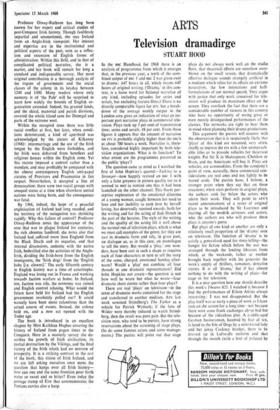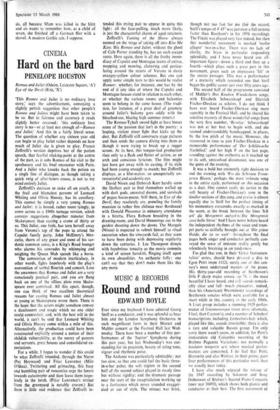Television dramadirge ARTS
STUART HOOD
In the Bac Handbook for 1968 there is an analysis of programmes from which it emerges that, in the previous year, a tenth of the com- bined output of BBC I and BBC 2 was given over to drama: 647 hours in all, which means 647 hours of original writing. ('Drama,' in this con- text, is a loose word for fictional narrative of any kind, including episodes for series and serials, but excluding feature films.) There is no directly comparable figure for Irv, but a break- down of the average weekly output in the London area gives an indication of what an im- portant part narrative plays in commercial tele- vision. Plays took up 3 per cent of transmission time; series and serials, 18 per cent. From these figures it appears that the amount of narrative on ITV is probably slightly higher than the BBC'S at about 700 hours a week. Narrative is, there- fore, considered highly important by both tele- vision organisations. What is its function? To what extent are the programmes presented to the public 'plays'?
The question came to mind as I watched the first of John Hopkins's quartet—Talking to a Stranger—now happily revived on sac 1 with only a faint greyness in picture quality (or so it seemed to me) to remind one that it had been launched on the other channel. This fluent per- ceptive exploration of the emotional dilemma of a young woman, caught between her need to love and her inability to earn love by herself loving, has deservedly received awards, both for the writing and for the acting of Judi Dench in the part of the heroine. The style of the writing and the quality of the acting lift it well above the normal run of television plays, which is what we must call examples of the genre; for they are cast in dramatic form and rely, in great part, on dialogue or, as in this case, on monologue to tell the story. But would a 'play,' one won- ders, have been cast in such a shape as requires each of four characters in turn to tell the story of the same, charged, emotional Sunday after- noon? Would a 'play' not combine all four threads in one dramatic representation? Did John Hopkins not create—the question is not how well he wrote but what he wrote—four dramatic short stories rather than four plays?
There are real 'plays' on television—in the sense of dramatic works conceived for the stage and transferred to another medium. MN last week screened Strindberg's The Father as a vehicle for Patrick Wymark; if the fans of Wilder were thereby induced to watch Strind- berg, then the result was pure gain. But the tele- vision men, who tend to be purists, have strong reservations about the screening of stage plays. (So do some famous actors and some manage- ments.) The purists will point out that stage plays do not always work well on the studio floor, that theatrical effects are somehow over- blown on the small screen, that dramatically effective dialogue sounds strangely artificial in a medium which relies for its effects on extreme naturalism, the low intonations and half- formulations of our normal speech. They argue with justice that only work conceived for tele- vision will produce its maximum effect on the screen. They overlook the fact that there are a considerable number of viewers in this country who have no opportunity of seeing great or even merely distinguished performances of the classics. The networks are right to bear them in mind when planning their drama productions.
This argument the purists will counter with the observation that it is suspiciously likely that 'plays' of this kind are mounted, very often, chiefly to impress the ITA with a few unimpeach- able titles or to provide vehicles for theatrical knights. Put Sir X in Shakespeare, Chekhov or Ibsen, and the Americans will buy it. Plays are vehicles, are commodities. From the company's point of view, naturally, these commercial con- siderations are real ones and not lightly to be waved aside. The purists have, I believe, a stronger point when they say that on these occasions, when stars perform in original plays, the authors rank far below the actors who adorn their work. They will point to Arv's recent announcement of a series of original plays to be introduced by Sir Laurence and starring all the modish actresses and actors; who the authors are who will produce these plays is anyone's guess.
But plays of cne kind or another are only a relatively small proportion of the 'drama' seen on television. The function of 'drama' is to satisfy a generalised need for story-telling—the hunger for fiction which before the war was assuaged through the lending libraries from which, at the weekends, father or mother brought back together with the groceries the week's supply of thrillers, romances, detective stories. It is all 'drama,' but if has almost nothing to do with the writing of plays—for stage or for television.
It is a nice question how one should describe this week's Theatre 625. 1 watched it because I find the performances of Eileen Atkins always interesting: I was not disappointed. But the play itself was as nasty a piece of work as I have seen on the screen for a long time—not because there were some frank exchanges about bed but because of the ridiculous plot. A middle-aged German businessman, haunted by fear of sex, is lured to the Isle of Dogs by a miniskirted lady and her jokey Cockney brother, there to be dressed up in Luftwaffe uniform and shot through the mouth (with a hint of fellatio) by
sis, all because M-um was killed in the blitz and sis wants to remember how, as a child of seven, she finished off a German flier with a shovel. A modern Gothic tale, I suppose.











































 Previous page
Previous page